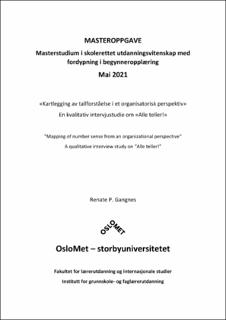"Kartlegging av tallforståelse i et organisatorisk perspektiv." En kvalitativ intervjustudie om "Alle teller!"
Master thesis
Published version
Permanent lenke
https://hdl.handle.net/11250/2789399Utgivelsesdato
2021Metadata
Vis full innførselSamlinger
Sammendrag
Dette er en kvalitativ intervjustudie med to skoleeiere og seks lærere som tar utgangspunkt i kartleggingsverktøyet «Alle teller!». Kartlegging i skolen har et forholdsvis stort fokus i media og i forskning, men faglige diskusjoner om kartleggingenes pedagogiske muligheter og begrensninger er begrenset til de nasjonale og de internasjonale kartleggingene. Ønsket med denne masteroppgaven er derfor å undersøke hvordan lærere og skoleeier forholder seg til og forstår et kartleggingsverktøy i matematikk som ikke er del av en nasjonal eller internasjonal kartlegging. Oppgaven belyser og drøfter hvilke organisatoriske og pedagogiske muligheter og begrensninger kartleggingsverktøyet «Alle teller!» gir for lærere og kommuner. Jeg har valgt å se nærmere på kartleggingen «Alle teller!» fordi den bli mye brukt i norske skoler. Problemstillingen besvares gjennom analyse og drøfting av intervjudata i lys av teori knyttet til skolen som organisasjon, vurdering og tallforståelse. Gjennom arbeidet med empiri og teori kom det frem at kommunen kun har søkelys på de nasjonale prøvene og de obligatoriske kartleggingene på 1. til 4. trinn fra Utdanningsdirektoratet. Det viste seg at det var disse kartleggingene som hadde størst fokus på de ulike skolene også, og at det var mest systematisk arbeidet rundt disse kartleggingene. Analysen viste en tendens til kausal sammenheng mellom manglende systematisk og målrettet arbeide med «Alle teller!» på systemnivå, og lærernes etter- og tiltaksarbeid. I tillegg viser studien et sprik i hvordan kommunen ønsker at det skal jobbes med for- og etterarbeid med «Alle teller!» i forhold til hva som var tendensen på de fleste skoler. Det er tendenser til at «Alle teller!» ikke forteller nok om elevenes tallforståelse og misoppfatninger, og lærerne hadde også ulike pedagogiske tilnærminger til både for- og etterarbeidet til kartleggingen. Det varierte mye blant lærerne i denne studien hvor mye håndboka var i bruk. Den skal være et nyttig planleggingsverktøy både før og etter kartlegging. Det kom også frem at skoleeiere ikke hadde grunnlag for å fortelle hvilke pedagogiske mulighet og begrensinger «Alle teller!»! hadde for kommunen. Dette gir grunn til å spørre om kartleggingsverktøyet «Alle teller!» faktisk bidrar til å gi nok informasjon for hva lærerne ønsker å vite om elevens tallforståelse og misoppfatninger, og peker kanskje på en begrensning i kartleggingsverktøyet funksjon. Funnene kan vise tendenser til at kartleggingsverktøyet ikke alltid blir brukt ifølge intensjonen. På den måten blir ikke det fulle potensiale benyttet. Hvordan kartleggingsverktøyet blir arbeidet med i organisasjonen kan dermed ha betydning for hvordan den pedagogiske praksisen endrer og utvikler seg. This quality study is based on interviews of two school owners and six teachers about the mapping tool “Alle teller!”. “Alle teller!” mapping in schools has a relatively large focus in the media and research, but academic discussions about the educational possibilities and limitations of the mapping tools are limited to the national and international test. The aim of this master's thesis is therefore to investigate how teachers and school owners proceed and understand mathematical mapping tools that is not part of a national or international survey. The thesis sheds light on and discusses what organizational and educational opportunities and limitations the mapping tool “Alle teller!» provides for teachers and municipalities. I have chosen to take a closer look at the mapping tool “Alle teller!” because it is widely used in Norwegian schools. The problem is answered through analysis and discussion of data from interviews in light of theory related to the school as an organization, assessment and number sense. Through the work on empirical data and theory, it emerged that the municipality only bring into focus on the national tests and mandatory test of 1st to 4th grade from the Norwegian Directorate for Education and Training. It turned out that it was these test that had the greatest focus in the different schools as well, and the systematic work was based on these tests only. The analysis showed a tendency towards causal relationship between a lack of systematic and targeted work with “Alle teller!” at the system level, and the teachers' supplementary work. In addition, the study shows a gap in how the municipality wants pre- and post-work to be worked on with “Alle teller!” in relation to the tendency in most schools. There tendencies are that “Alle teller!” not telling enough about the pupils' number sense and misconceptions, and the teachers also had different pedagogical approaches in how to prepare for the tests and how to use the results for making actions plans. There was a lot of varied among the teachers in this study how much the handbook was in use. It should be a useful planning tool both before and after mapping. It also emerged that school owners had no basis to tell which educational opportunities and limitations “Alle teller!” had for the municipality. This gives reason to ask if the mapping tool “Alle teller!” actually helps to provide enough information for what teachers want to know about the student's numerical understanding and misconceptions, and perhaps points to a limitation in the screening tool function. The findings may show that the mapping tool is not always used according to the intention. In this way, the full potential is not reached. How the mapping tool is worked on in the organization can thus have an impact on how the pedagogical practice changes and develops.
